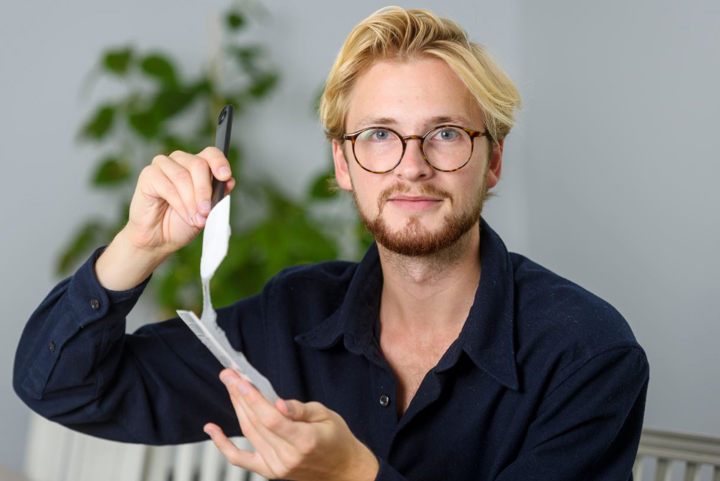Several million tons of plastic waste pollute the environment every year, and disposable or single-use plastic is a significant contributor to the problem. In response, a student from Gothenburg has been able to find the solution to the problem with "Potato Plastic", an environmentally-friendly alternative to the use of disposable plastic in the fast-food industry.
Behind the invention is Pontus Törnqvist, 24, winner of the Swedish leg of the James Dyson Award 2018. This is the first time the award has run in Sweden.
Potato Plastic consists only of potato starch and water. It is heated until the liquid thickens, then placed in moulds and heated to solid. The resulting material is a kind of thermoplastic – a plastic created by heating which hardens when cooled – meaning that it is mouldable, and can be shaped into any form. For the fast-food industry, from cutlery and straws to salt and pepper bags. Because Potato Plastic is made of only naturally-occurring substances, the products take just two months to decompose.
Originally from Gothenburg, Pontus Törnqvist studies Industrial Design at Lund University. As Swedish National Winner of the James Dyson Award 2018, he receives 22,000 SEK to develop Potato Plastic - and a chance to win the international final of the competition.
"A large part of the plastic that comes into the environment comes from the fast-food industry. We need better options! Potato Plastic comes from the ground and can be composted without harm to nature. The idea can also be adapted to other countries and to what crops they grow there."
says Pontus Törnqvist.
Potato Plastic now progresses to the next stage of the James Dyson Award, where Pontus Törnqvist will compete against entries from 26 other countries around the world. The prize money in the international competition is 340,000 SEK.
Runners-up
Both Swedish runners-up will also proceed to the international stage of the James Dyson Award 2018.
WASP (Wind turbine Autonomous Service Protocol)
Umeå student Pontus Edman thoroughly researched the maintenance work of offshore wind turbines. He discovered that there are many problems with manned maintenance, including the time and number of technologies it takes to service the turbines, the risks associated with bad weather, the hazardous working environment, the extensive training required, and time-consuming and unreliable transport by boat to the wind power plants. WASP is a self-propelled nut and bolt checking solution for wind turbines that functions throughout the turbine’s life cycle. All maintenance data is monitored, documented and fed back in real-time to operators on land.
TERRA
TERRA is designed for vulnerable homes located in earthquake-prone areas. It provides these poor regions with information, guidance and security, minimising risks and increasing security in earthquake situations. TERRA saves valuable time in an emergency where every second counts by alerting the user to both real and false-alarm threats. Behind the idea are the Umeå students Ferdinand Aichriedler, Manuel Hess and Patrick Krassnitzer.



Share this page on